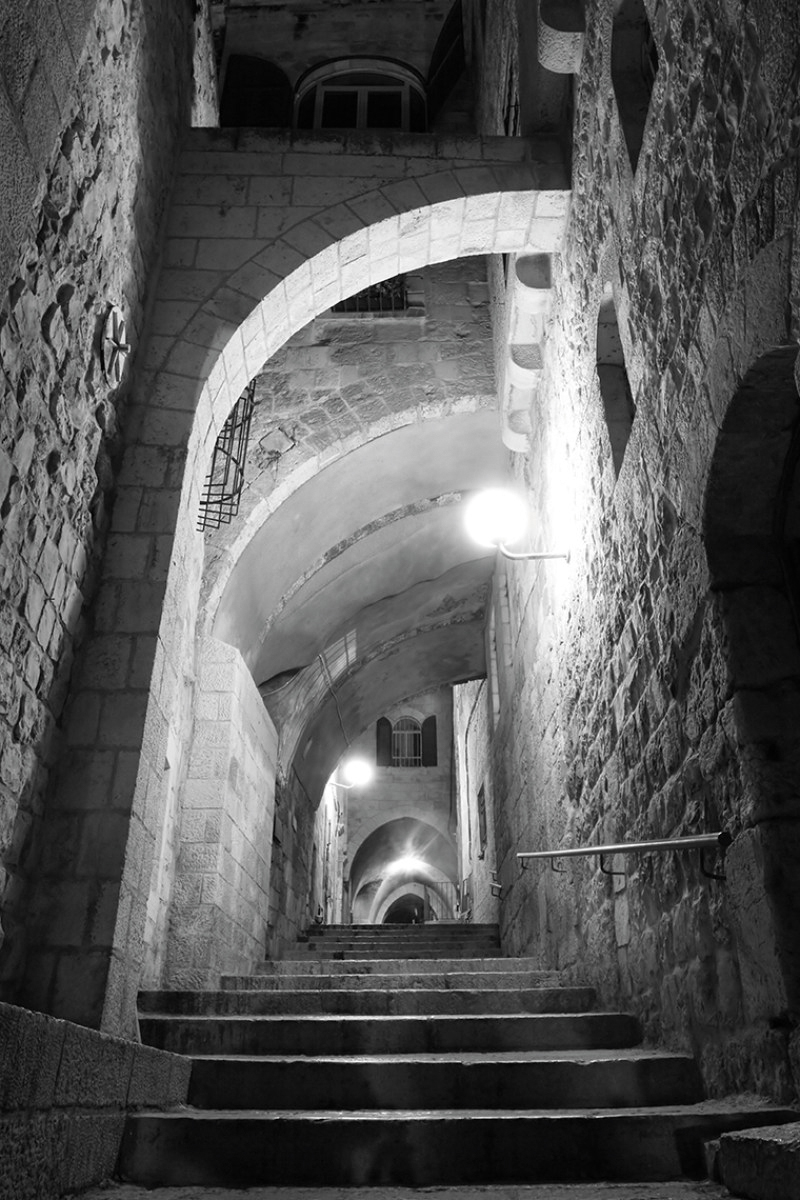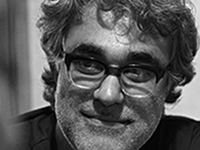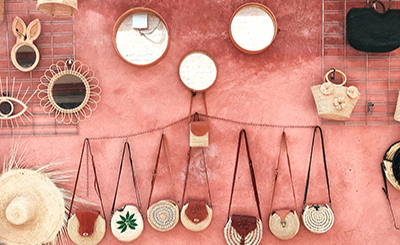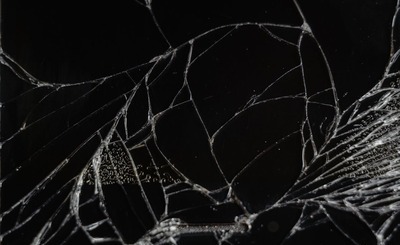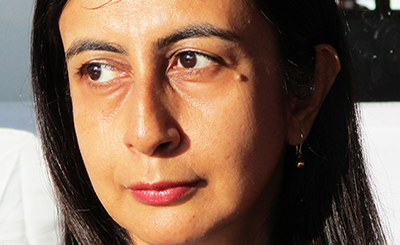She imagined herself in the dogs’ eyes, rising up from under the ground as she climbed the stairs from the street into the wide garden. They had been lazing under the shade of wooden benches on the porch, and when she appeared they pushed their heads up into the afternoon heat and snarled. One was small and black, with tufts of white hair in his ears and feet. He stood first, unsteadily, and barked without real ferocity. The other dog, a brown and gray mutt with slender legs and nimble, harelike movements, shook his head nervously and bared his teeth, letting out a single, threatening bark. But when the woman approached the door, both dogs quieted down and only advertised the blunted whiteness of their teeth in slackening growls devolving into whimpers.
Inside, she encountered the solitude of a high, vaulted ceiling and a man’s voice echoing in the many curved hollows far above: “Mutti and Benni, they did not bark?” He spoke English with a halting German accent, and introduced himself as the hotel’s manager. A wisp of beard on his chin made his face look unwashed.
She pushed her passport across the counter, face down. “Yeah, they did. The small one barked and then stopped, but not the other. Not much, you know.”
The manager read her name aloud, pronouncing it slowly: “Sonia? Then you’re not Arab?”
“Does it matter?”
He shrugged, “Nothing matters, not really.”
“Half Indian,” she explained.
“Half?”
“My dad’s side. Mom’s Dutch-Irish.”
“Farid!” the man shouted. “Farid!”
A thin-limbed, sallow man appeared, perhaps only a teenager, wiping his hands on a blue and white kitchen towel.
“Is this woman an Arab?” the manager demanded.
Farid examined the new guest with wide, drowsy eyes. He shook his head, “No, of course not,” he said without conviction one way or the other. He turned to walk away when the manager called him back.
The manager said, “They didn’t bark at her. Mutti and Benni. They didn’t think she was an Arab. I thought she was an Arab, but the dogs didn’t bark, so I thought, maybe she’s a Jew.”
Farid took a second look at the woman, though this time only a glance. He threw the towel over his shoulder. “So,” he said, gesturing with his hands. “She cannot be an Arab. Why ask me?”Saying this he walked back across the polished tile floor with an uncertain, limping gait, and disappeared, submerging below the top level of stairs leading down.
The manager smiled. “It’s just that Mutti and Benni, well, we didn’t know when we got them. They were dogs owned by a settler in Ariel. They were trained to hate Arabs. They bark at any Arabs they see, or even smell. Poor Farid’s life is a misery here when the dogs are out.”
“Back where my father come from,”Sonia said impatiently, “They’d kill any dogs that barked like that.”
The manager shifted his eyes to the door leading to where the dogs waited in the shade.
“Yes,” he said, almost harshly, “We’ve thought of that. We’ve lost many of our best distributors. They won’t come, not with Mutti and Benni out there. But what can a man do. Mutti is old now, and Benni, you know I’m hoping we can change him. What happened with you was, how you say, wonderful. They didn’t bark at you. Not much. With Arabs they almost attack them. But you give me hope. Maybe we can train Benni.”
“Don’t forget I’m a woman.”
“But they bark at any Arabs.”
“I’m not an Arab.”
The large covered porch rose from a disarrayed garden. Sonia sat on a bench watching Farid. The dogs were nowhere to be seen. What she had guessed as a limp was in reality an ungainliness in Farid’s movements. He walked with quick nervous motions, always looking around himself or at the pavement by his feet.
He leaned against one of the iron poles supporting the wooden cover for the porch, his eyes abstracted by the expanse of sky and horizon spiked with television aerials, kites and houses built on houses faltering up the city’s swaggering relief of hills and valleys. A cigarette played on his lip and thin spools of smoke escaped from his mouth in impatient breaths.
She said, “Hi,” and garbled the only word of Arabic she knew, “Assalam.”
Farid answered in German, “Tchuss,” and smiled. He had a thin, drawn face that was not without elegance. When his eyes stopped moving, they looked clear, almost handsome. “You are Indian, yes?” he asked.
“No. I’m from America. From California.”
“Ah, California.” He stretched out each syllable. “Very nice. Very, very nice. I too would like to be from California.” His teeth reappeared with a faint, inviting smile. “You just come?”
“This is my first time in Israel.”
“Beautiful here, yes? Old City is beautiful.”
“I haven’t seen much of it yet. I only got in yesterday.”
“Trust me. You will like it very much.” Farid looked away; smoke curled over his face, shrouding his nose and eyes. “You Muslim?” he asked finally.
She looked up into Farid’s eyes, at his almost tubercular frame. He wore an Oakland A’s tee-shirt, and a small, silver crucifix hung from his neck. On his feet were beat up Nike Airs. His new, crisply blue Levi’s were large for him, as though he were a child who would grow into them.
To say something, she asked, “How old is that?” pointing to a massive cactus shrouding one half of the porch with the shade cast by warped and braided arms.
Farid shrugged. “A hundred years, maybe more. I think as old as this.” His gesture included the hotel, perhaps the whole city.
Then he said, “I’m waiting.” The hand holding the cigarette gave a terse gesture towards the door. “I have to go back to work soon. So I wait.” She nodded, unsure of what else to say.
Then Farid again, his voice loud, a fist lightly thumping his chest: “I,” a pause, “I am an Israeli citizen.” And he smiled. She was attracted by the smile and by the confidence of the statement. She sensed that he was confiding in her, that he was telling her something he would not tell just any guest. The trust gave her a sense of privilege.
It was already warm and a thin sheen of perspiration formed over Farid’s face and neck. Sonia studied the side of his neck, the smooth line it made as it arrived, the stark veins carrying it, at his jaw. His mouth, no longer face on, the lips drawing in occasionally, pulling in, pushing out the smoke which hovered in the air a brief moment and was gone, trembling, perhaps nervously — was he afraid the dogs might appear? — and the uneven profile of his nose.
“You’re handsome,” she told him, pushing the words out of herself the same way she imagined him exhaling the cigarette smoke, letting it run over his tongue and teeth and lips.
“Only someone very American would say that.” He dropped the cigarette down at his feet and slowly crushed the butt with the tip of his foot, moving his heel slowly back and forth in a precise arc.
She felt stung by the comment. Of course she was very American, but his words made her deny it. “I wasn’t born there,” she lied. “I’ve only lived there a few years. That’s all.”
Farid nodded. He said he had to go back in to work. She watched him mount the steps up to the porch and pull open the wide, wooden door. A group of young men pressed out as Farid stepped inside. All were divinity students, she had learned, from Estonia. Several smiled as they passed her and walked into the gardens and disappeared. She stood and then she sat down. She could hear car horns and voices shouting and somewhere the air trembled to the cutting blades of a helicopter.
When she walked alone through the city’s crowded alleys and covered markets she would invent pasts for herself, losing herself in the crowds and noise and smells. “Hello. Welcome. Come into my shop. Indian, no?” And she would say, “No, from Sri Lanka.”“Sri Lanka, also Ceylon. So beautiful. I have a friend who ...” Or she might answer, a confused expression betraying an unfamiliarity with English, “I am from the Gambia.” And once, “My parents are diplomats in Turkmenestan, but I was born in Malaysia.” She had lived in a village in Oman where the peasants brought her dates every day, only the ripest; she had been educated in Italy; she was a strange and rare reverse albino from Sweden where government doctors had spent fifteen years studying her condition and three separate scholars had published their PhDs on the relationship between the disease and lycanthropy in the historical folk imagination. With everyone she met she was new person, inventing stories and names and countries and lineages all her own and all false.
She pushed through hot, crowded streets, searching for the cooler passages of the covered markets, a place where the sun only broke through in vents, and where the top of the street suggested another world, where footsteps clattered on the roofs. Around her voices clamored for her eyes, shouting, “Indian! Hindi! Italian! Amreekan!” The voices demanded that she enter their shop, the best shop, where everything was only one sheqal, yes, all just one sheqal. And others that shouted “Indian and Arab, brother and sister,” fading behind her. She watched the tourists, sweating in their tee-shirts, scattered in groups, blocking the thin passageways of the Via Dolorosa, dragging massive wooden crosses like unsteady rudders, chanting, singing: This is where He fell, this is where He was flagellated, this is where ... When she would walk into a shop she would bargain for an hour, sometimes two, all the while knowing she would not buy what she was dealing over. When she left the shopkeeper’s curses followed her down alleys. She cherished the sound of their curses, noting the tone and the words and the vehemence which she would repeat, she felt sure, over long drinks back home.
In crowds men pushed up against her, pressing a hand against her breast or thigh, and she would let them linger there, as though oblivious, enjoying the illicit sensation of a stranger’s desire, until the moment she felt the hand emboldened, becoming proprietary, and then she would lash out with a fist and a series of violent abuses, as though she had just felt the man’s hand for the first time.
She ate breakfast in the main hall, which was entered through two large oak doors to one side of the reception. On its walls hung portraits from the turn of the century, all men sporting pompous moustaches and ridiculous looking domed and peaked helmets. Farid served the drinks. His wiry form buzzed from table to table, asking what was wanted, smiling, pouring coffee or tea, quickly moving on. She scrutinised him constantly, noticing how at certain tables he stopped, his lips moving quickly, bantering, though she couldn’t hear what was said over the general noise. She regarded these other tables with envy, and when Farid moved on from them, she examined the faces of the people he had stopped to chat with, to laugh with, for some clue, some hint of commonality with herself that might be exploited to stop Farid for more than the time it took the coffee to pour.
In truth, she wanted Farid to fill her mornings by simply standing at her table, not moving at all, waiting on her and only her. She wanted him to lean in close when he poured coffee, so that she would smell the busy odour of his movements. But most of all she wanted more than just the simple, “More coffee?” said slyly, perhaps mockingly. At the other tables, his tongue enlarged, and sometimes she heard faint echoes of Hebrew, or German, or Arabic, all spoken with equal fluency. She drank the coffee quickly, cup after cup, every morning, so that she would bisect Farid’s scattered orbit as many times as possible. She imagined kissing him, testing his lips, and in this growing passion, she began to tell herself that she did not know if she could control herself; she thought of Farid casting a spell, or as an influence, almost meteorological that acted upon her; his reticence was like a storm waiting at sea, and in it she knew that she would lose herself.
At night she said to the mirror in her room: “I will lose myself. I will lose who I am.” Her voice suggested fear, her lips trembled. “I will lose myself in a strange and foreign passion and I will never be the same,” and added with a hint of drama,“And I may never return home.”
Some days after she arrived, pushed by the jostle of the noonday crush, she stood at the Damascus Gate, crowding through the tight L-shaped passageway that in previous millennia had acted as a last defence, but also as a gateway and birth canal to invasions and new orders. The sun in the widening plaza struck her eyes with sudden force. It was so much brighter here and hotter than inside the Old City; the change disoriented her and her steps were confused and haphazard and her loss of composure was only heightened when she caught sight of Farid. He was only a few steps away, standing inside a half circle of three soldiers.
The soldiers were tall and handsome and when she walked up to them she saw that all four had been laughing and stopped when she spoke. Their presence unnerved her. “Farid?” she said.
The soldiers turned to look at her, the tallest one smiling. It was not an inviting smile: it appraised her. His finger played along the smooth black of an ammunition cartridge.
“I just saw you and thought I’d say hi.”
Farid shrugged. “Hi.” He did not look at her directly, but looked first behind her and beyond her head and then down at the feet of one of his companions.
The tallest soldier gave her a quick nod. “American?”
“I’m just a tourist,” she said. “I’m staying over at the hotel where Farid works.”
The soldier spoke quickly to Farid in Hebrew, and Farid nodded, said something back, and all three soldiers smiled.
Sonia spoke again. “I was surprised to see him, you know, among, well, you, soldiers.”
“It’s okay, no problem, see, they are my friends,” Farid assured. His tone was brusque, almost matter-of-fact, much the same as when she had first seen him in the hotel and when he had assured the manager that she could not be an Arab. She had expected something else, something more familiar, perhaps accompanied by a smile and she felt let down by him.
The tallest soldier smiled and put an arm around Farid’s shoulders, pulling Farid’s thin frame up close so that it pressed into his bulletproof jacket, and into the grenades hanging across his chest. The other two soldiers began laughing, bantering in Hebrew. Farid released a quick smile.
“Farid is our brother,” the soldier said. “Just like one of us.”
Farid pulled away. His smile was gone. “I am,” he demanded. “I am one of you.”
The soldiers began to laugh.
Farid gave the three of them a finger and then a smile returned to his face.
The tallest soldier stopped laughing and put an arm around Farid’s neck. “Of course he’s one of us, yeah.” Then he turned to Sonia. “How do we know you’re just a tourist?”
“But Farid —”
“I don’t know her,” Farid said.
With his free hand the soldier took hold of his rifle and ran the point of it along Sonia’s belly and then up to her breasts. She felt the end of the rifle press into her skin and she did not know if she enjoyed the sensation or was frightened by it.
“Maybe we should interrogate her?”
The other soldiers smirked.
Sonia turned red. She shook her head, feeling oddly exhilarated by the presence of the soldiers and by the sense of threat they exhibited.
“Would you like that?”
She smiled and moved her head cautiously from side to side and backed away, almost tripping over a woman squatting on the floor. The woman shouted and battered her legs with blunt fists. As Sonia pushed out through the crowd, she heard faint eruptions of laughter from Farid and the soldiers. She was shaking. She had enjoyed the feel of the man’s gaze, and now she asked herself why she had run away so quickly. She walked up into the shallow hills of East Jerusalem, replaying the feel of the gun, of the man’s voice, of Farid’s mocking laughter when she walked away. She decided to take a taxi back. The man in the cab laughed, “The Damascus Gate? Sure. Ten sheqals.” She paid without bargaining. The cab arrived at the Damascus Gate in less than two minutes: “Here.”
The next morning Farid didn’t appear at breakfast. A young woman with a thick mane of dark hair tied back behind her neck offered, in German, “Kaffee?”Sonia nodded, disappointed. Her eyes searched the room for a clue of Farid, for the shadow of his thin figure. But he wasn’t there. She ate breakfast slowly, allowing the coffee to cool, untouched. It was when she was sitting on the porch, writing a postcard, that Farid walked up the path.
He wore a pair of brown cotton slacks, a plain white shirt, the sleeves rolled up above the elbows, and produced a thin smile when he noticed her, giving his progress a casual and unconstrained air.
She watched him as he mounted the steps onto the porch.
“You weren’t at breakfast?”
“Today I am free. No work. I just come to collect my pay.”
“You like the work here?”
“Not bad. Apart from the dogs this place is very nice, yes?” He stood for a minute, his eyes on nothing, and then he asked, “What you do today?”
“I don’t know. Walk around, maybe check out the New City. I haven’t seen much of it yet.”
“Have you been to the church?”
“Which one?”
“There only one. The big church. The Holy Sepulchre.”
“Oh, no. I keep forgetting to go.”
“But you must. It’s the most beautiful church anywhere. Really. You must go.”
“Yeah, I’ll try.”
“No, you go today. It’s a good day. Not very hot. You can write letters later.”
“Where is it?”
“I’ll take you. No problem, okay? I go in and get my pay first. But you must see the church.” Farid paused, his eyes down. “You know, I am sorry, yesterday, about my friends. They are very rude. I hope you do not think me so rude.”
Sonia smiled. “No, no, not at all. I was just surprised by them. They’re soldiers, what do you expect.”
“Yes, they’re soldiers.”
Fridays at this hour the streets became a crush of bodies choking the roads, all walking, slowly, quickly, some blind, and children darting between legs, in the direction of the Al-Aqsa Mosque. Sonia was slapped and jostled by the motion of the crowd as she followed Farid. The older men, dressed in suits or in jelabiyyas, the young men in tee-shirts, in plain dress shirts, in fancy pants that sparkled in the sun; and the women, following their husbands in the crowd, several paces back, huddled together, their heads covered, their dresses, bright, resonant, a spontaneous spring in the old streets, flowering, their faces laughing, stern, silent, their hands grabbing at their children, holding a baby, slapping a kid or pulling another along by the resisting oar of an arm.
Farid’s supple figure plied ahead, pressing forward, shouldering people aside, his elbows digging out a common path in the smothering crowd. “Come on!” he called over his shoulder. “Come on, quickly!”
She followed as best she could, and with a few quick strides, a fleeting opening in the crowd, she found herself thrown against him. She allowed Farid to take her hand. “So you don’t get lost,” he said. And then, “It is always the same. Every Friday, like a circus,” and he waved his free hand dismissively above his head. She enjoyed the feel of his fingers clutching hers, and of the pressure of his insistent and claiming tug.
They moved away from the alleys leading to the mosque and, now more slowly, navigated through streets she had walked along many times. “Hey, Indian!” shopkeepers shouted. Or, “Malaysia!” Or “Switzerland! Come back, I have something for you.” Or, “Lady from Thailand, remember to come back, eh!” She didn’t respond to the shouts; her thoughts, instead, rested in the warmth of Farid’s palm, the ease of Farid’s gesture.
“Why they shout at you?” he asked without warning.
“What?”
“All the shopkeepers. They call you different names. India, Korean, Australia. Why?”
“You’re wrong. They must be shouting at someone else. There’s so many people on the street.”
Farid said nothing. After a few moments he slipped his hand out of hers. “We are almost there.”
Ahead of them, a green tractor pulling a cartload of fresh bread hiccuped indecisively up the hill, its path meandering from right to left and back again. The young man driving, cigarette hanging from his lip, in a dirty, once white tee-shirt, shouted loudly, his arms waving, signalling for people to get out of the way. Farid pulled Sonia back, away from the path of the tractor, and with his arm pushed her against the glass facade of a coffee shop. “They are mad, these drivers. Each year, so many children die. For what? Some bread.” But she only felt the warmth of that arm, its coercive and urgent compulsion.
They passed under a low stone archway and found themselves in an open plaza, small clumps of tourists wearing caps or hats, their faces in books, water bottles slapping against their waists, and soldiers, guns on their hips, and monks pressing the stone with each footfall, and young kids, hawking postcards, old men shouting, in English, in French, in Italian, “Mister, a tour of the holy site? I know everything to tell.” And on the far side of the small plaza, the church, its facade hidden by scaffolding, the dome barely visible. It looked an unimpressive building of tan stone lost between two larger walls on either side. It did not even look like a church, and instead resembled the forlorn hulk of some bygone administration’s bureaucratic headquarters.
“Come, I will show you everything,” Farid promised.
Under and through the scaffolding, the church opened out into darkness and labyrinths, and, Farid explained, intrigues, fights, hatreds, battles over ancient turf. He made the sign of the cross on his chest and kneeled, kissed the ground. This was the burial place of Christ, he said, and showed her the sepulchre, a small unassuming structure, covered again with scaffolding, standing in the centre of the main hall. Candles surrounded it with an excitable and trembling glow, and as they ducked low to press into the narrow vault, Farid whispered, “Be careful of your wallet in here.”
The walls explained themselves only through the rectilinear geometry of gold painted icons and their frames, rosaries hanging from nails scored their own vertical slashes and, tall, austere candles burned with a luminescence she imagined had remained unchanged for centuries, if not millennia. On a chair sat a monk in a thick brown cloak, his face hidden. There was barely room for the three of them and she rested her elbow on the tomb just for a place to put it. The tomb was only a slab of undistinguished marble, rubbed smooth by the untiring activity of the hands and lips of worshipers. Farid was silent, his eyes closed and head bowed. After a minute, he opened his eyes and, with an already lit candle, he lit another and placed it over the tomb so that the wax dripped, Sonia guessed, onto the spot where Christ’s right eye no doubt stared, blinking and annoyed.
The monk bent forward and whispered to Farid, and Farid shook his head in response. The monk louder, this time with his hand held out, repeated what he said.
“What does he want?” she asked.
“Money, always money,” Farid sneered.
“But shouldn’t we give something, a contribution, you know.”
The monk turned his hidden face on Sonia, and held out his hand again. The fingers were swollen and blistered.
Sonia pulled out a bill from her purse, but Farid stopped her from handing it to the monk. “Don’t be stupid, they are all thieves here.”
The monk began to shout angrily, and Farid started pushing Sonia out through the archway. The monk stood, his hands stretched out, trying to grab the money from her hand. Farid pushed the monk away and down, and as she stepped out, she saw the monk inside, straightening himself, pulling his cape back over his face. His head was hairless and his lips ballooned out; his nose was lopsided and grotesque.
“They are all thieves in here,” Farid repeated, his voice shaking from anger. “I would spit if this was not a church.” When he pushed her out, his hands had felt strong and his touch attractive. She experienced a restless and growing agitation.
Much of the church was empty, and she followed him, their footsteps echoing against the darkness surrounding them, against the ancient glimmer of an oil painting, its surface cracked, the wood frame pulling apart. There were small clumps of tourists following guides, their voices muttering in different languages. Sometimes a monk in a dark brown cloak hurried passed them, empty-handed, or carrying a candle, or distractedly swinging a brazier leaving in its wake a dense and failing stream of gray and aromatic smoke.
“They all hate each other here,” he said explaining the five denominations that together governed the church. “Not one of them will talk to any of the others. They have their little places they are allowed to go where the others cannot tread. It is like you used to have, the cold war. And so nothing gets done.” Farid stopped, pointing to a stack of several paintings pushed into one corner. When they approached she detected a thick patina of dust scouring the cracked oils. “These are beautiful paintings. They took them down five years ago to clean them, but then they could never agree who was to put them up again, and so they sit here, waiting for anyone who wants to take one. See?”
She laughed. She thought it really very silly.
“It’s not funny. The roof is falling down, and do you know who put up the scaffolding? Not the church. They couldn’t even meet to talk about it. It was the Arab Council. Do you believe that? It is true. The Jews didn’t want to get involved with these fools.”
The set of wide, stone stairs narrowed as they fell into the dark chapel, underground, a chapel which itself had dark portals leading down again, “to the old shrines,” explained Farid. On the walls of the passageway innumerable Crusader crosses were etched into the surface of the rock, and on columns, themselves etched out of the walls, were the vague memories of rosettes, rubbed almost into oblivion by centuries of hands passing across them.
“This is my favourite,” Farid said. They stood alone in the chapel. At the far end an ornate altar waited, swaddled in gold cloth, in silver candlesticks, in old icons.
The ceiling was globed in braziers, hanging as though in a Sultan’s tent, or in a harem whose atmosphere duelled between licence and control. “When all the lights are on, it is so beautiful,” he said. “Like heaven.” Only two braziers were lit, and Farid’s face almost vanished in the shifting, evanescent glow. She watched his mouth, his lips, the way he breathed, in awe and supplication. She felt the compulsion of the darkness of the room, its illicit mystery waiting here under the ground. Her heart was beating rapidly.
She would tell herself later that it was this atmosphere of strangeness, the aroma of exotic perfumes, the cowled monks that earlier had pressed close to her: all this contributed to what she did. She would tell herself she felt Farid press close to her, his face turning towards her, smiling, as though offering himself. She was a tourist, after all; she had a right to such behaviour.
